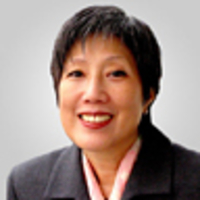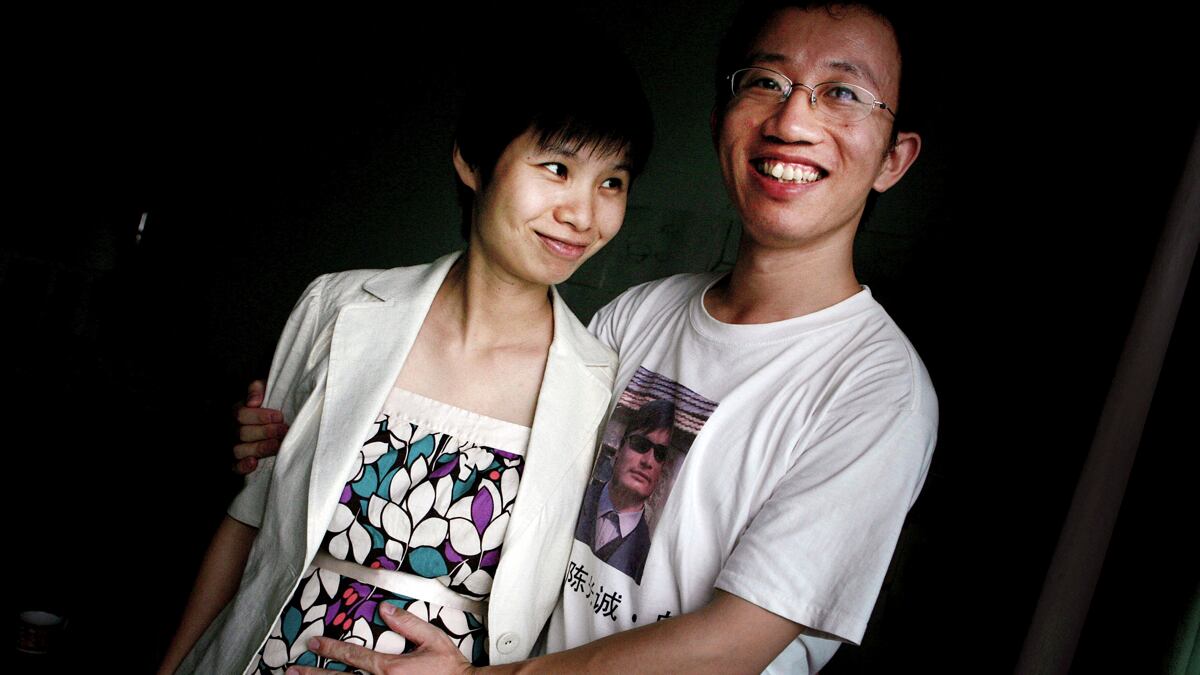Blind activist Chen Guangcheng phoned me Tuesday morning sounding buoyed by hopes that Chinese authorities will allow him to travel to the U.S. for legal studies. (Chen is a self-taught legal advocate but was never allowed to take formal law courses.)
Since April 22, Chen has been at the vortex of an extraordinary Sino-U.S. drama, in which he made a dramatic escape from house arrest in Shandong, entered the U.S. embassy, and emerged under bilateral understandings that allowed him to seek medical treatment and live a "normal life" with his family in China—or so he initially thought. But after discovering his wife had been tied to a chair and threatened by guards in Shandong while he was in the embassy, Chen had jittery second thoughts and decided he wanted to go abroad.
Ultimately a new deal was reached, which he expects will allow him to take a fellowship at New York University, accompanied by his family. He said a Chinese official had met with him four separate times—"we talked nearly three hours total"—to hammer out details such as how he could get a passport without having to return to Shandong, the scene of his past torments.
I asked: Any regrets?

"Mostly worrying about my family. Aside from that, I have no regrets," Chen told me. His most urgent concern is his 33-year-old nephew, Chen Kegui. Intruders wielding sticks broke into the rural Shandong farmhouse of Chen's brother, Chen Guangfu, and began attacking those inside shortly after Chen’s miraculous escape to the U.S. Embassy. Alarmed, Kegui brandished a knife and, official accounts say, slashed at the intruders, inflicting injuries, then fled.
The nephew is now in police custody, Chen said, while his brother was detained, questioned, and released. "My nephew's wife found a lawyer, but now it seems the lawyer himself is under house arrest and cannot take the case. I must do something to help free him—can you please find my nephew a lawyer?"
Kegui may face criminal charges. In an ironic twist, Chen fears Kegui may experience a replay of his own trial, which many legal analysts said was deeply flawed. "Of all of the friends and family that Chen will leave behind, his nephew is the most vulnerable," says exiled Chinese activist Bob Fu of the Texas-based Christian NGO ChinaAid, who has been in touch with Chen and has offered assistance. "Obviously there was a clash with security guards [at Chen Guangfu's house], and the government can give Chen's nephew the same trumped-up charges that Chen himself was found guilty of."
In August 2006, Chen, who'd enraged local authorities by exposing the fact that they'd illegally forced thousands of women to undergo sterilizations and abortions in the name of China's one-child-only family-planning policies, was sentenced to four years and three months in prison on charges of "damaging property and organizing a mob to disturb traffic."
The plight of Chen's nephew underscores concerns about other friends and family. Their fate remains a key yardstick for measuring the central government’s sincerity. Chen and his wife, Yuan Weijing, worry about "breaking the heart"—his words—of his 78-year-old mother, Wang Jinxiang, who lived with the couple and helped care for their daughter, now 6, all the while watching the couple endure years of beatings, harassment, his imprisonment, and a stifling (and illegal) form of house arrest. "She lived with us and could go out to buy vegetables for us. But now she's terrified, and she doesn't dare go out the door," Yuan told me. "Once we leave for America, she'll be very lonely and will miss us a lot."
Chen also had relied heavily on his brother, Guangfu, who lived just a four-minute walk from Chen's farmhouse in the same village. When I first met Chen in Beijing in 2001, his brother was with him and they eagerly discussed their campaign to teach farmers about their rights. Later, Chen told me he was writing a book about his experiences, dictating to his brother, who wrote everything down.
Then there are the activists and friends who’ve lent moral and logistical support to Chen before and during his escape. When I asked him to recount how he fled from Shandong, he said he was driven for about nine hours in a truck by Nanjing-based teacher and activist He "Pearl" Peirong. (She'd disguised herself as a courier to gain access to his heavily guarded village.) But Chen declined to divulge details about how they managed to connect while he was on the run. "It was complex, very complex, to arrange. I can't tell you now because we don't know what will happen to her in the future," said Chen, "Let's make sure everyone's OK, and then we'll talk more."
Both Pearl and another activist involved in Chen's escape, Guo Yushan, had been detained by authorities the day after Chen entered the U.S. embassy. They've since been released—and the good news is that both were told by government officials that "they weren't criminal suspects," said ChinaAid's Bob Fu, who's been in touch with numerous Chinese activists. "He Peirong said she was at peace. Both she and Guo were told they were brought in for information-gathering purposes only, not arrest. Then they were released with warnings not to give press interviews. That's good—though the government could always find excuses to 'settle accounts' and do whatever they want, especially with activists found to have been doing something else."
It goes without saying that authorities will try to expose the underground web of sympathizers and logistics that helped Chen. They clearly don't want to see a repeat of this loose-knit network's evasion of dozens of guards and the Big Brother–type monitoring techniques that had been part of Chen's extralegal house arrest since September 2010. After Guo, a Beijing-based scholar believed to have helped mastermind Chen's flight from Shandong, was released, he told foreign media he underwent 50 hours of questioning. "They wanted every detail of his escape."
Human-rights lawyer Jiang Tianyong has already felt officialdom's wrath. Last week when Jiang tried to visit Chen in Chaoyang hospital, he was grabbed by plainclothes security personnel, driven by car to a hotel, and punched so badly that he thought his hearing had been damaged. He was allowed to return home, but his movements are closely monitored. "Now that the news cycle appears to be moving on, we need to be sure that Chen's friends and relatives aren't forgotten," says Sarah Schafer, a Hong Kong–based researcher for Amnesty International (and a former Newsweek reporter). "Given authorities' past record, it's hard to trust any assurances that those who helped Chen will be OK."
A poignant case is that of Chen's longtime friend and fellow activist, Hu Jia, who met Chen secretly in Beijing before the blind activist entered the American embassy, and Hu's wife, Zeng Jinyan, who tweeted news of Chen's escape. Hu, 39, is best known for his activism on behalf of Chinese with HIV/AIDS; he's also campaigned for democracy, environmental protection, and the endangered Tibetan antelope (he practices a form of Tibetan Buddhism and gave his young daughter a Tibetan name). In November 2007, Hu had criticized Beijing's human-rights record via Web camera before European parliamentarians—an unprecedented, high-tech achievement for the beleaguered activist community that may have inspired Chen himself to address last week's U.S. congressional hearing on Capitol Hill via a mobile phone held up to a microphone held by ChinaAid's Fu.
For years Hu and Zeng have lived a cat-and-mouse existence with authorities, withstanding house arrest, intimidation, his jail sentence, and intense surveillance—often heroically blogging about the family's travails inside their residential compound paradoxically named "Freedom City." Before I visited them once in December 2007 for a photo shoot, Zeng warned me that guards stood watch and even slept on the stairway leading to their fourth-floor flat. "You might be turned away or even detained," she warned me. Since 2008, authorities have tried even harder to control foreign media. Today news broke that the government is expelling the Beijing bureau chief of Al Jazeera English in a case that pre-dated Chen's escape. It is the first expulsion of an officially accredited foreign correspondent in more than a dozen years.
But when the photographer and I—lugging lights and other gear, including a large roll of white paper for the portrait backdrop—clambered upstairs, the rough wooden planks that security personnel had slept on were empty. Hu and Zeng seemed chatty and upbeat, showing off their baby, Qianci, who'd been born the previous month. The couple speculated about the reason for the unusually lax security. Hu joked, "If it weren't for the [coming] Olympics I'd be behind bars now."
A week later, he was. Hu was tried and imprisoned for three and a half years on charges of "inciting subversion of state power." (During his incarceration, he received the European Parliament’s Sakharov Prize for Freedom of Thought.) After his release in June 2011, Hu was supposed to observe a year's "deprivation of political rights"—an Orwellian term that can be interpreted to include various forms of "soft" detention and other restrictions that could be used as an excuse to punish him for meeting Chen on the run, and for taunting officialdom by posting on the Internet photos of the two of them together. In an encouraging sign, however, Hu was told by interrogators last week—as were Pearl and Guo—that he wasn't suspected of any crime.
Zeng, meanwhile, had already been feeling the enormous pressures and personal sacrifices she's endured during her life with Hu. In February friends were saddened to read her tweet that, while the couple remained "respectful friends ... the love has disappeared. Please understand." More recently Zeng posted news on her Twitter account about Chen’s daring flight into the embassy and his subsequent fears about continuing to live in China. Those tweets were followed by a more sobering one last Thursday: "This morning [state security guards] followed me in a black car when I was sending my child to kindergarten ... I won't be able to leave my house for a few days. This is the beginning of my house arrest."
Zeng had been hoping to pursue a master's degree at the Chinese University of Hong Kong, which offered her admission in March. Over the weekend, she tweeted that police have repeatedly denied her request to leave mainland China so that she can take up the university's offer. "Last year, I began to talk to police about my study plans. But until now, the result is always the same: they won't let me go."
Even as Chen seems poised to realize his dream of studying law—albeit abroad and not in China, which was his initial desire—his individual case cannot count as a sweeping advance for human rights in China. The recent tumult over his escape may lead to even greater difficulties for those left behind.
In our phone call today, I asked if any of his own lawyers would be willing to represent his nephew. "I don't know," he said. "They've all suffered so much already for representing me." During Chen's own trial, the lawyers he chose to defend him were harassed and ultimately banned from the courtroom. Chen was hastily assigned a public defender who didn't have time to familiarize himself with Chen's case. “I don't know who I can ask to risk so much for our family. The right lawyer is hard to find, especially in the countryside.” Chen himself knows that only too well.






